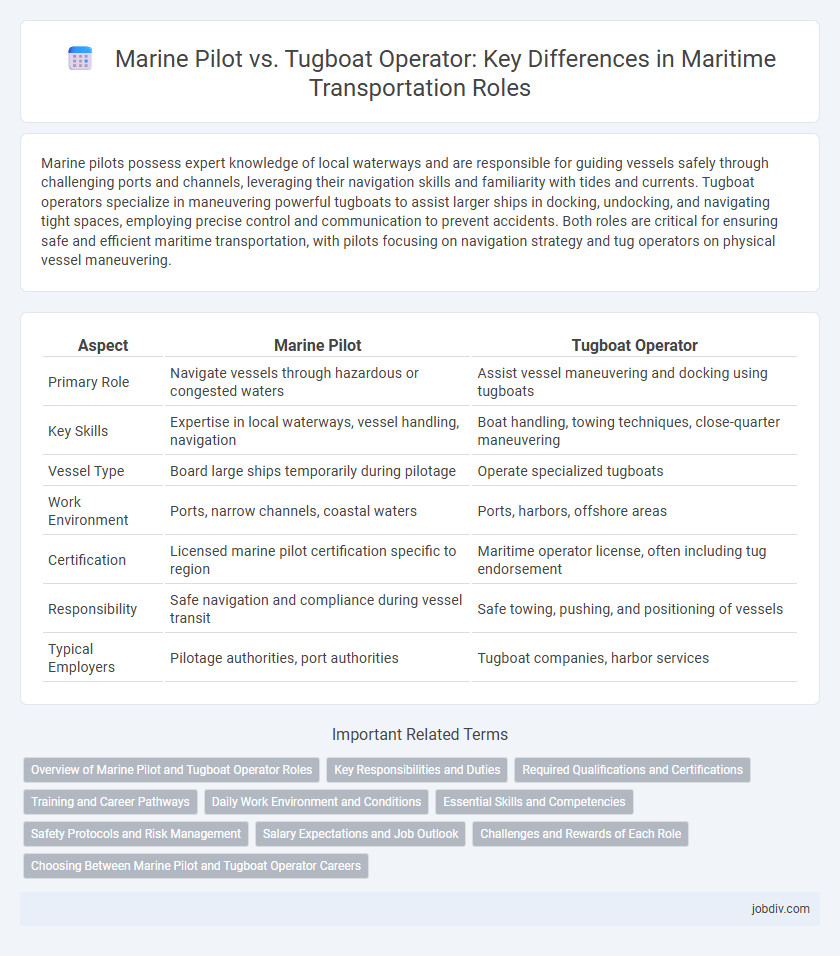Marine pilots possess expert knowledge of local waterways and are responsible for guiding vessels safely through challenging ports and channels, leveraging their navigation skills and familiarity with tides and currents. Tugboat operators specialize in maneuvering powerful tugboats to assist larger ships in docking, undocking, and navigating tight spaces, employing precise control and communication to prevent accidents. Both roles are critical for ensuring safe and efficient maritime transportation, with pilots focusing on navigation strategy and tug operators on physical vessel maneuvering.
Table of Comparison
| Aspect | Marine Pilot | Tugboat Operator |
|---|---|---|
| Primary Role | Navigate vessels through hazardous or congested waters | Assist vessel maneuvering and docking using tugboats |
| Key Skills | Expertise in local waterways, vessel handling, navigation | Boat handling, towing techniques, close-quarter maneuvering |
| Vessel Type | Board large ships temporarily during pilotage | Operate specialized tugboats |
| Work Environment | Ports, narrow channels, coastal waters | Ports, harbors, offshore areas |
| Certification | Licensed marine pilot certification specific to region | Maritime operator license, often including tug endorsement |
| Responsibility | Safe navigation and compliance during vessel transit | Safe towing, pushing, and positioning of vessels |
| Typical Employers | Pilotage authorities, port authorities | Tugboat companies, harbor services |
Overview of Marine Pilot and Tugboat Operator Roles
Marine pilots possess specialized knowledge of local waterways, guiding large vessels safely through ports and narrow channels by providing expert navigation assistance. Tugboat operators manage powerful tugboats to maneuver ships during docking, undocking, and transit in confined harbor areas, ensuring vessel positioning and safety. Both roles require extensive maritime experience and coordination to prevent accidents and facilitate efficient port operations.
Key Responsibilities and Duties
Marine pilots specialize in navigating vessels through challenging ports and waterways, ensuring safe passage by providing expert knowledge of local conditions, tides, and hazards. Tugboat operators focus on maneuvering tugboats to assist larger ships during docking, undocking, and navigating tight spaces, employing precise control to prevent collisions and groundings. Both roles are crucial for maritime safety, with marine pilots guiding overall vessel navigation and tugboat operators executing tactical maneuvers.
Required Qualifications and Certifications
Marine pilots must possess a valid pilot license issued by maritime authorities, extensive local knowledge of specific waterways, and certification in ship handling and navigation safety. Tugboat operators are required to hold a commercial captain's license or equivalent, certifications in towing operations, and training in engine maintenance and emergency procedures. Both roles demand continuous education and compliance with maritime safety regulations to ensure operational competency.
Training and Career Pathways
Marine pilots undergo rigorous specialized training in navigation, ship handling, and local waterways before obtaining certification, often requiring years of maritime experience as deck officers. Tugboat operators typically complete vocational training programs and apprenticeships focused on vessel maneuvering and towing techniques, with career advancement linked to accumulating hours at sea and operational expertise. Both careers demand strong maritime knowledge, but marine pilots usually pursue higher-level credentials, while tugboat operators follow skill-based progression within port operations.
Daily Work Environment and Conditions
Marine pilots navigate ships through congested ports and narrow waterways, often working on pilot boats in variable weather conditions and shifting tides. Tugboat operators manage powerful vessels that assist larger ships by towing or pushing them, frequently facing strong currents and close-quarter maneuvering challenges. Both roles demand high situational awareness and adaptability to dynamic maritime environments, but tugboat operators typically endure more physically demanding tasks aboard heavy machinery.
Essential Skills and Competencies
Marine Pilots possess expert knowledge of local waterways, strong decision-making abilities, and precise navigation skills to safely guide vessels through challenging maritime environments. Tugboat Operators demonstrate exceptional ship-handling skills, excellent communication, and proficiency in towing operations to assist in docking, undocking, and maneuvering large ships. Both roles require acute situational awareness, teamwork, and adherence to maritime safety regulations to ensure efficient and secure vessel movement.
Safety Protocols and Risk Management
Marine pilots follow strict safety protocols involving vessel navigation in hazardous waters, coordinating closely with tugboat operators to mitigate risks such as collisions or groundings. Tugboat operators implement risk management strategies including precise maneuvering, communication checks, and emergency response drills to ensure the safe escort and docking of large ships. Both roles require comprehensive training in maritime safety standards and real-time decision-making to prevent accidents and environmental damage.
Salary Expectations and Job Outlook
Marine pilots typically earn a higher salary than tugboat operators, with average annual wages ranging from $70,000 to $120,000 depending on experience and port location. Tugboat operators generally make between $50,000 and $80,000 annually, influenced by factors such as vessel size and operating region. Job outlook for marine pilots remains stable due to the specialized skills required for navigating large vessels, while tugboat operators face moderate growth driven by increased maritime traffic and port activities.
Challenges and Rewards of Each Role
Marine pilots navigate vessels through challenging waterways, relying on expert local knowledge to prevent accidents and ensure safe passage, often facing unpredictable weather and tight schedules. Tugboat operators manage powerful tugboats to assist larger ships in docking and maneuvering, requiring precision, strength, and teamwork to handle heavy loads in confined spaces. Both roles demand high skill levels and offer rewarding opportunities to contribute critically to maritime safety and efficient port operations.
Choosing Between Marine Pilot and Tugboat Operator Careers
Choosing between a marine pilot and a tugboat operator career depends on preferred responsibilities and skills within the maritime transportation industry. Marine pilots specialize in navigating large vessels through challenging port waters using advanced knowledge of local waterways and regulations, while tugboat operators focus on maneuvering tugboats to assist ships with docking, undocking, and navigating tight spaces. Career opportunities for marine pilots often require extensive certification and experience, whereas tugboat operators benefit from hands-on vessel handling skills and can advance to supervisory roles within tug services.
Marine Pilot vs Tugboat Operator Infographic

 jobdiv.com
jobdiv.com